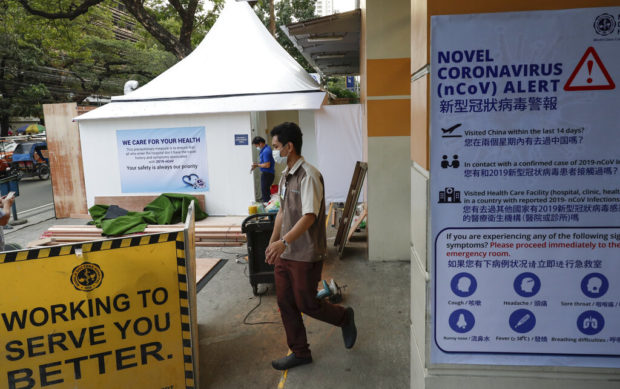
Workers set up a quarantine area for patients with recent travel history from China or those with symptoms of the new virus outside a private hospital in Manila, Philippines on Friday, Jan. 31, 2020. The World Health Organization declared the outbreak sparked by a new virus in China that has spread to more than a dozen countries a global emergency after the number of cases spiked more than tenfold in a week, including the highest death toll in a 24-hour period reported Friday. Health officials in the country recently confirmed the Philippines’ first case of the new virus. (AP Photo/Aaron Favila)
MANILA, Philippines — Interior Secretary Eduardo Año ordered on Sunday all the barangays in the country to form health emergency response teams to help contain the spread of the 2019 novel coronavirus even as the Philippine National Police warned merchants that they are ready to help the national and local government to prevent the hoarding of medical supplies, particularly face masks.
Año said in a statement that the creation of Barangay Health Emergency Response Teams (BHERT) would help address the crisis and allay fears that may worsen the situation.
He pointed out that every barangay must have adequate information on the disease and be prepared to adopt protocols to contain it, saying, “We have to prepare, God forbid, for the possible eventuality that 2019-nCoV reaches our communities.”
The interior secretary said BHERTs should comprise of an executive officer, a village watchman, and two barangay health workers and they must be sufficiently equipped with protective gear.
Eyes and ears
According to Año, the BHERTs would serve as “the eyes and ears of the government” in ensuring that residents in their communities are all accounted for and are fully informed about the Wuhan virus and that the BHERTs visit the homes of people who have just arrived from a virus-infected country and provide a list of people they might have had contact with.
The BHERTs are likewise tasked to observe the newly arrived passengers for symptoms and require them to record daily body temperatures for the next 14 days, the incubation period of the virus, while confined to their homes.
Should they observe symptoms, including cough and colds, fever, difficulty in breathing, and shortness of breath, the BHERTs must immediately isolate the suspected coronavirus carrier in a room away and require the patient to wear an N95 mask before transfer to a Department of Health referral center or hospital for further tests and treatment.
Home confinement
Family members of suspected coronavirus carriers must also be placed on 14-day home confinement and the BHERTs must repeat the process of checking, including contact tracing, on them. Before lifting home confinement or quarantine, the BHERTs need to report the case to the city or town health officer.
Meanwhile, the PNP warned businessmen that they will not hesitate to arrest those who attempt to hoard medical supplies, particularly face masks.
According to PNP spokesperson Brig. Gen. Bernard Banac, the police will assist the Department of Trade and Industry and local government units in stopping people from hoarding or diminishing medical supplies.